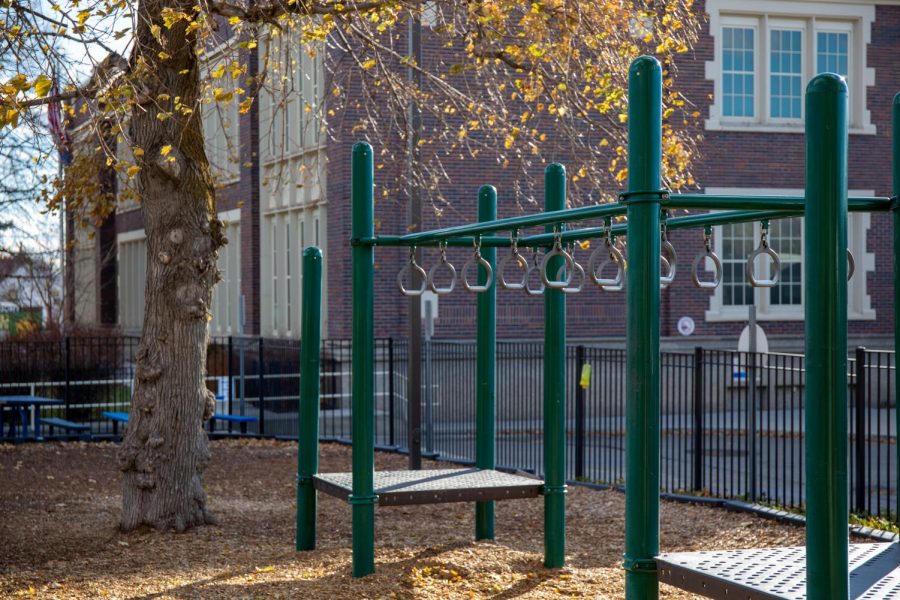Poma: Utah Needs In-School Suicide Prevention at Every Grade Level
The McGillis School in Salt Lake City on Nov. 14th 2020. (Photo by Gwen Christopherson | The Daily Utah Chronicle)
February 15, 2021
Utah’s youth suicide rates have steadily increased over the past decade. According to the Utah State Board of Education, “From 2011 to 2015, Utah saw a 141% increase in suicides among youth ages 10-17, compared to an increase of 23.5% nationally.” This statistic is frightening to say the least. Thankfully, Rep. Brian S. King is sponsoring H.B. 93, which would require Utah schools to adopt youth suicide prevention programs. State lawmakers have a responsibility to pass this bill so our suicidal teens are not left alone.
Over the years, some have speculated that Utah’s conservative culture and the influence of the Church of Jesus Christ of Latter-day Saints plays some part in our high youth suicide rates — especially because suicide attempts are all too common among Utah’s LGBTQ+ teens. Relatively widespread ownership of firearms in Utah has also been posited as a cause. H.B. 93 would help combat this growing issue in our state and protect children before it’s too late.
Under H.B. 93, all school districts and charter schools would have to implement a youth suicide program. These programs would provide resources for students who are being cyberbullied, rejected by family members over sexuality or gender or facing other threats to their mental and emotional well-being. Programs would also address mental health, suicide intervention and postvention and discuss warning signs of suicide with Utah students and their caregivers.
King’s bill also outlines steps for the state school board to implement such programs in collaboration with the Department of Health and state suicide prevention coordinators. This aspect of the bill is essential since it builds in proper program monitoring by health professionals and the state. And, importantly, the bill covers training for the adults who would run the programs. This could pave the way for stronger relationships between mental health professionals and educators, which is crucial for teen suicide prevention.
H.B. 93 is unique in that it would improve access to mental health support not only through funding but by providing these resources to children grades K-6, a group often neglected in these conversations. Of course, to expand the programs’ reach from secondary schools only to all state-funded schools, the bill also outlined a 50% decrease in per-pupil spending on suicide prevention. A previous program dedicated $1,000 per pupil; H.B. 93 would provide only $500. While some Utahns have expressed concerns over this change, King clarified the intentions behind it.
“There’s the bill itself, which goes through a standing committee and is a statutory change. And the other component is to increase the amount of funding — that requires an additional appropriation,” King said in an interview. I don’t want to expand the program and the requirements for the State Office of Education without providing the funding that’s necessary to implement the program effectively. So the per-pupil spending is going to decrease, but we’re going to increase our resources overall and increase the effectiveness of the program.” While additional funding for in-school suicide prevention programs would be even better, this expansion to elementary schools is a step toward safer school environments and improved mental health for Utah children.
And children need to have easy access to such vital programs, even if the initial budgets are a bit smaller than is ideal. If young children don’t have opportunities to learn about or discuss mental health problems or issues at home, they could carry these feelings well into their young adulthood. King says, “Oftentimes if we don’t address suicidality in K-12, it’s more likely to be a significant issue when we get to a point where they’re in their undergraduate work or graduate school.” While schools like the University of Utah have the resources to discuss mental health and help students with counseling and other resources, this bill would provide younger Utah students with a safe space to talk. They shouldn’t have to wait until they’re older to seek help.
Of course, children also need to be able to talk openly about suicide with their parents or caregivers. We have a cultural stigma surrounding suicide. In a state and a society where many adults don’t feel comfortable enough to approach others about mental health problems, we can’t expect our children to do so. And although many online resources exist about how to talk to children about suicide, not all parents who need them know where to look. With suicide prevention programs present in every school, reliable information would be more accessible to parents.
Implementing H.B. 93 would make schools a safer place for students to talk about mental health issues and get necessary protection — a change Utah desperately needs. But even then, there will be plenty of work left to do to reduce youth suicide in our state. We must continue to advocate for more youth mental health support. “Help comes in from many different areas,” King said. “And it doesn’t necessarily have to be formally through our school system. It can be just from a more attenuated and greater awareness in society at large.”
Author’s Note: If you’re struggling with suicidal thoughts, please call the National Suicide Prevention Lifeline at 800-273-8255, or visit suicidepreventionlifeline.org/ to chat with someone.








